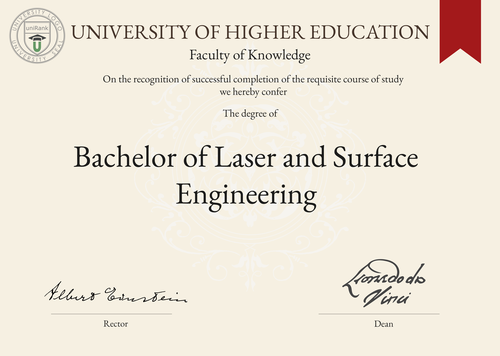
Bachelor of Laser and Surface Engineering (B.L.S.E.)
Guide to Bachelor of Laser and Surface Engineering Program/Course/Degree
Bachelor of Laser and Surface Engineering (B.L.S.E.)

Program Name:
Bachelor of Laser and Surface EngineeringProgram or Degree abbreviation:
B.L.S.E.Duration range:
The duration of the program typically ranges from 3 to 4 years.Tuition range:
The tuition fees for the program vary depending on the chosen country or university. Please refer to the respective university's website for specific information.Overview:
The Bachelor of Laser and Surface Engineering program is designed to provide students with a comprehensive understanding of laser technology and its applications in surface engineering. Students will gain knowledge and skills in laser materials processing, surface modification techniques and laser safety protocols.Curriculum Overview by year:
- Year 1: Introduction to Laser Technology, Mathematics for Laser Engineering, Materials Science Fundamentals - Year 2: Laser Materials Processing, Surface Engineering Principles, Laser Safety - Year 3: Advanced Laser Applications, Surface Coating Techniques, Industrial Internship - Year 4: Laser System Design, Research Project, Elective CoursesKey Components:
- Laser Technology: Understanding the principles and applications of lasers in various industries. - Surface Engineering: Learning techniques to modify and enhance the properties of surfaces. - Laser Safety: Ensuring the safe operation and handling of laser systems. - Materials Science: Understanding the behavior and properties of materials used in laser engineering.Career Prospects:
Graduates of the Bachelor of Laser and Surface Engineering program can pursue careers in industries such as manufacturing, aerospace, automotive and research and development. Possible job roles include Laser Engineer, Surface Coating Specialist, Research Scientist and Quality Control Engineer.Salary Expectations:
The salary expectations for graduates of the program can vary depending on factors such as the country, industry and level of experience. Generally, laser and surface engineering professionals can earn competitive salaries with potential for growth. For a more accurate understanding of salary expectations, you can utilize the Job Sites Search Engine, from our sister site jobRank, which searches over 4,600 job sites worldwide. Make sure to specify not only the job title but also the country you are interested in.Conclusions:
It is important to note that the duration, tuition fees, curriculum, key components, career prospects and salary expectations of the Bachelor of Laser and Surface Engineering program can vary based on the chosen country or location for studying the program, as well as the chosen university. Prospective students are advised to research and compare different universities and countries to find the best fit for their educational and career goals. Visitors can search for universities offering the Bachelor of Laser and Surface Engineering program worldwide through the uniRank World Universities Search Engine.World Universities Search Engine
search for Bachelor of Laser and Surface Engineering (B.L.S.E.) and add the Location (country, state etc.) or specific University you are interested in studying at.
Query examples:
- Bachelor of Laser and Surface Engineering (B.L.S.E.) United States
- Bachelor of Laser and Surface Engineering (B.L.S.E.) United Kingdom online
- Bachelor of Laser and Surface Engineering (B.L.S.E.) Australia international students
- Bachelor of Laser and Surface Engineering (B.L.S.E.) University of California
- Bachelor of Laser and Surface Engineering (B.L.S.E.) University of London tuition fees
- Bachelor of Laser and Surface Engineering (B.L.S.E.) University of Sydney scholarships
Share Program/Course
Interesting? Share this program/course/degree info with your friends now.